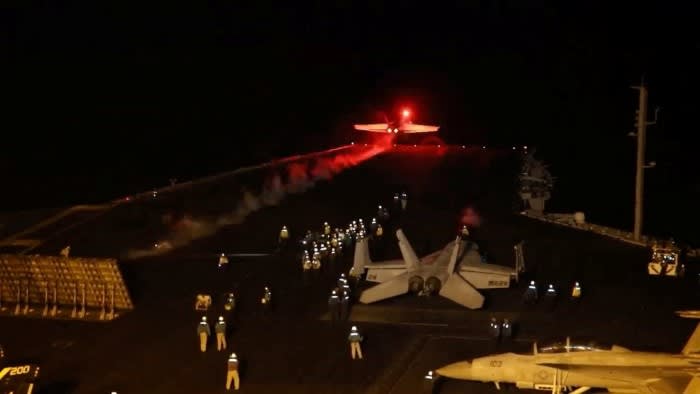Stay informed with free updates
Simply sign up to the Oil myFT Digest — delivered directly to your inbox.
Crude oil prices rose on Friday after the US and UK launched air strikes against Yemen-based Houthi rebels whose attacks against ships in the Red Sea threatened the flow of goods through one of the world’s most important trade routes.
Brent rose 3 per cent to $79.78 a barrel while WTI, the equivalent US benchmark, gained a similar amount to $74.35 a barrel, their highest points of the week.
US President Joe Biden confirmed that he had ordered strikes, supported by the UK RAF, in response to “unprecedented” attacks by the Iran-backed militants on vessels in the area.
Despite a series of brief rises in response to attacks in the Red Sea and heightened tensions in the Middle East due to the Israel-Hamas conflict, oil prices have remained relatively muted and have barely moved from the start of the year, when crude was trading about $79 a barrel.
The modest price moves suggest traders believe that any conflict or heightened threats to oil shipments are still relatively unlikely to have a significant impact on supplies, though traders said many would be cautious about betting against the price heading into the weekend.
“The prospects of the conflict spreading to the wider region have clearly grown,” said Tamas Varga, at oil brokerage PVM.
Western governments have been debating how to respond since the Houthi rebels started attacks late last year in an area through which nearly 15 per cent of global sea trade passes.
A US-led military coalition and shipowners had tried to strengthen security in the Red Sea last month but it has done little to deter attacks, increasing pressure on the governments to strike the rebels in Yemen.
Others fear that military action risks escalating the conflict across the Middle East. Bjarne Schieldrop, a commodities analyst at SEB, warned that the air strikes may prompt retaliation by Iran and its allies.
“The fear in the oil market is that the region is on an unpredictable escalating path where at some point down the road supply of oil will indeed in the end be lost,” he said.
Iran, which backs the Houthis, on Thursday seized an oil tanker off the coast of Oman, just south of the Strait of Hormuz on the other side of the Arabian peninsula, the world’s most important oil shipping route.
Traders and analysts have been wary of making aggressive forecasts for oil this year, as concerns about the instability in the Middle East have been offset by worries about global demand and uncertain economic outlook.
With additional reporting by Stephanie Stacey in London
